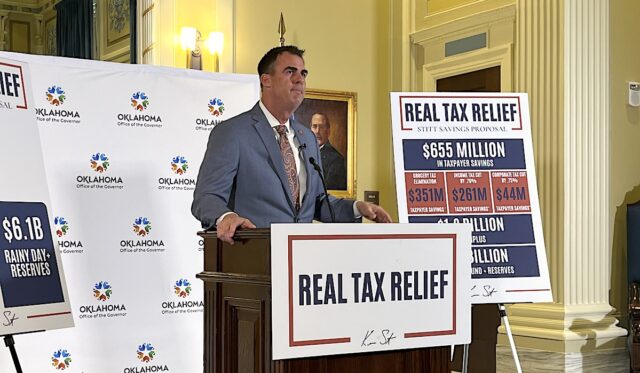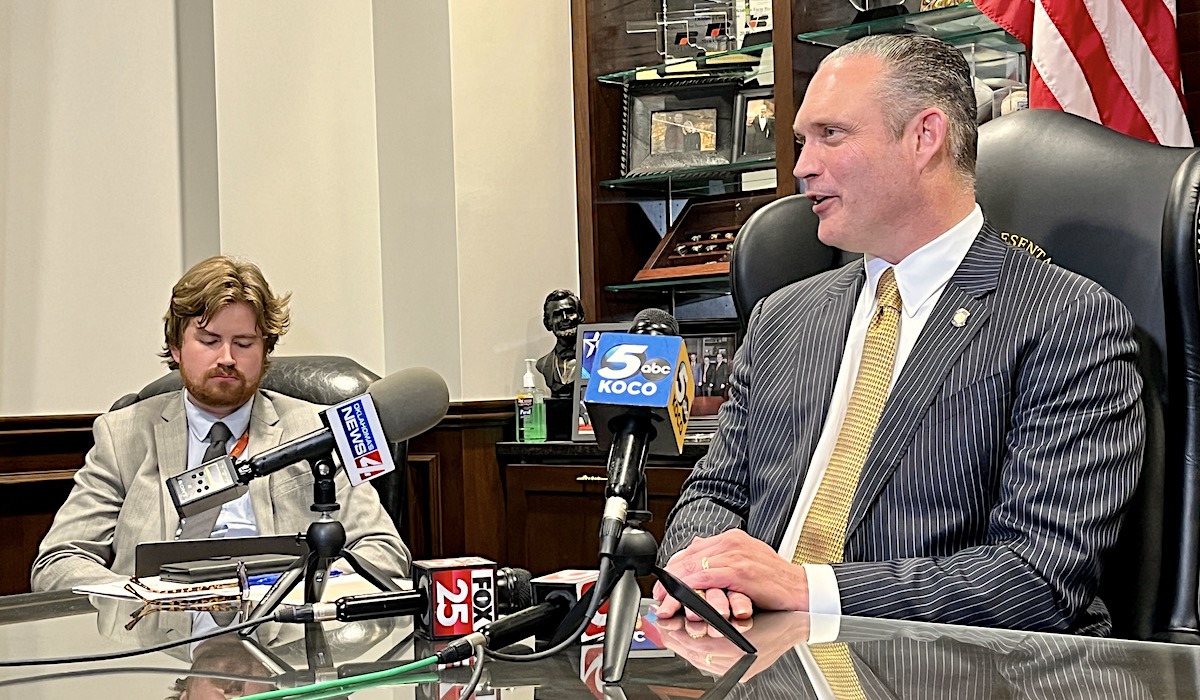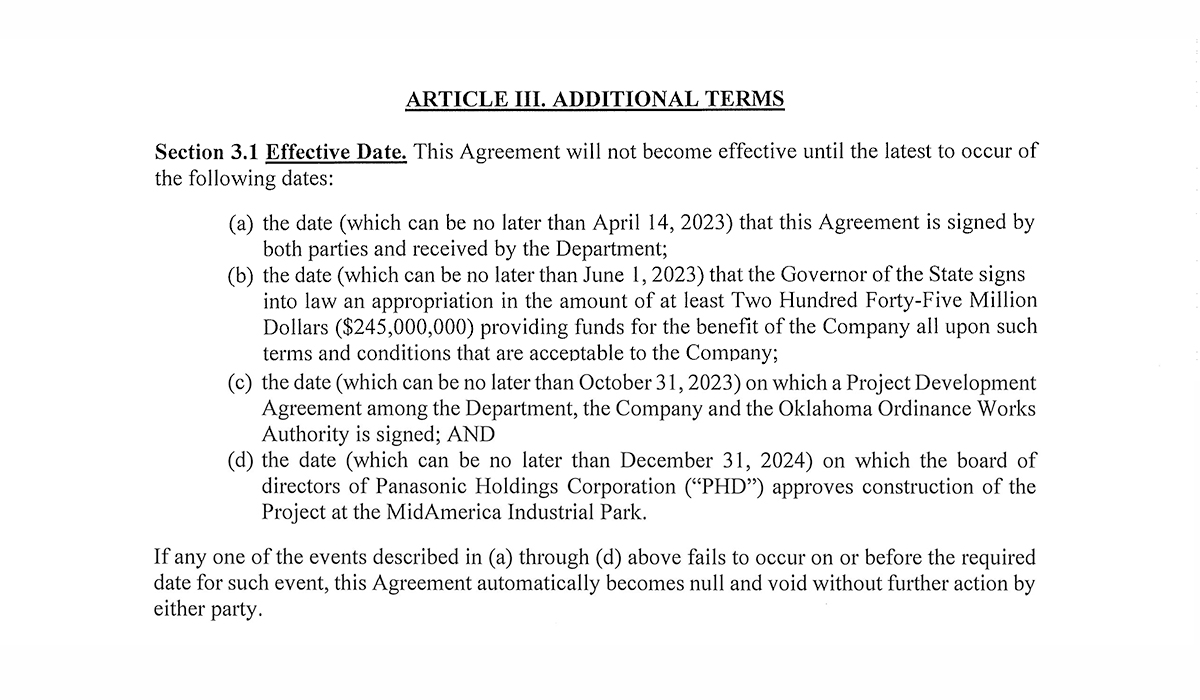

State leaders would like to land a $5 billion Panasonic battery manufacturing plant with 3,500 new jobs in northeast Oklahoma, and the company has “entered into an agreement” that could allow it to take advantage of $698 million in economic development incentives set aside by the state Legislature last year.
But the agreement between Panasonic and the Oklahoma Department of Commerce (embedded below) stipulates a contingency that, by June 1, the governor must sign “into law an appropriation in the amount of at least $245 million providing funds for the benefit of the company all upon such terms and conditions that are acceptable to the company.”
Six weeks out from the Oklahoma Legislature’s constitutionally-required date of adjournment, that provision of the Panasonic agreement appears to be the current sticking point in a session where all major items of negotiation — education proposals, tax cuts, economic development projects and the overall state budget — are clogged up like a horse that ate two hands of green bananas.
“Well, we’ve got a lot of things that need to start moving, you know? A lot of different log jams,” said House Speaker Pro Tempore Kyle Hilbert (R-Bristow). “We’ve got another deadline next Thursday, so stay tuned.”
During his weekly media availability Friday, Oklahoma Gov. Kevin Stitt outlined the additional request from Panasonic for state investments in the area of the MidAmerica Industrial Park. Stitt said the facility would span about 5 million square feet, making it “one of the largest in the country.”
“(It is) just an amazing project when you see it,” Stitt said of the proposed battery plant. “But you need infrastructure, you need roads. So there’s a few little Ts to cross and Is to dot to get the correct egress, ingress in those facilities. A few maybe day care centers, a few more fire stations. There are some community investments that the Legislature will probably make to put that on the finish line.”
Stitt said it is common for businesses to negotiate additional “development agreements” beyond simply accessing whatever economic development incentives a state offers.
“It’s about a $5 billion investment, and when they’re doing those kinds of things, there’s development agreements, there is site work, there is infrastructure,” Stitt said. “There are commitments they have to have from the state. So yes, there’s going to be a commitment from the Legislature to have to figure out a way to spend this $245 million either through [the Oklahoma Department of Transportation] or through the MidAmerica site to get that site ready.”
Although Stitt said the requested $245 million would involve “community investments,” the April 11 agreement for the potential Panasonic deal only specifies that the Legislature would be “providing funds for the benefit of the company.”
Senate, House debating ‘ancillary issues’

Asked Monday about the additional $245 million requested by Panasonic, House Speaker Charles McCall (R-Atoka) said the items listed by Stitt on Friday were part of discussions last year between state leaders and Panasonic.
“It wasn’t necessarily $245 million last year,” he said. “That park is a state-owned asset, so spending money there is understandable, but we want to know what the details of that spend look like.”
McCall said the number is likely larger this year because a proposed tax increment finance (TIF) district proposed in support of infrastructure near the MidAmerica Industrial Park was roundly defeated by Mayes County voters. During the Nov. 8 general election, the TIF proposal received only 36.1 percent support among 12,320 total voters.
Now, with Panasonic making its proposed Pryor battery plant contingent upon an additional $245 million appropriation from the Legislature, leaders of the Republican House and the Senate find themselves in disagreement over whether this proposal should be contingent upon other major policy and budget negotiations between chambers.
“We have told the governor we will go along with what he wants to do to land that company, and the Senate leadership is completely on board as long as there are not any ancillary issues that he wants us to agree to or they want us to agree to,” Senate President Pro Tempore Greg Treat (R-OKC) said Thursday. “We’re not going to agree to any other unrelated bill to get this through. We are agreeing to getting economic development landed and doing what that takes, but no ancillary tied to it.”
McCall, meanwhile, said his House Republican Caucus wants an agreement with the Senate on tax reductions if the state is going to dedicate even more resources to the Panasonic project.
“I think it’s a win for the state of Oklahoma, yes I do,” McCall said Monday. “We can’t be myopic where this is the only thing that gets done this session. I think we’ve got to have tax cuts for the people of the state of Oklahoma. We’ve got to leave more money in their pockets to deal with this inflation. So the House is taking a very holistic view of things for the state.”
McCall has previously pushed for reductions or eliminations of the state individual income tax and the corporate income tax. The Legislature reduced both of those rates as part of its budget deal in 2021.
“We think the taxpayers of the state of Oklahoma need to be a part of that discussion and everybody can have a win here,” McCall said. “We don’t need to forget about the businesses and the people that are already here as well.”
House Minority Leader Cyndi Munson (D-OKC) said it was “fascinating” to hear Stitt and legislative Republicans discuss “another $245 million to put toward Panasonic.”
“My understanding from what I’ve heard [the governor] say and what I’ve read is that Panasonic is asking the state to invest in itself — infrastructure, I think he talked about fire stations, day care centers,” Munson said Monday. “So again, a large corporation, Panasonic, who has turned us down before is saying, ‘Please invest in yourself before we invest in you.'”
Munson said workforce development is a key issue for any major employer, which she said underscores the need for better investments in Oklahoma’s public education system.
“What we’ve continued to ask is to invest in public education, to provide a teacher pay raise separate from any type of (school choice) voucher scheme and find ways (…) to encourage improving our public education, affordable housing infrastructure,” Munson said. “These are things we should be doing regardless of whether or not a company is asking for it.”
‘Commerce is continuing discussions with the company’

As legislative leaders debate how much money should be dedicated to economic development this session, Panasonic is not the only international company looking for financial incentives to build a manufacturing facility in Oklahoma.
First reported by Reese Gorman of The Frontier, the North American branch of the Italian energy company Enel is considering construction of a solar panel manufacturing plant at the Port of Inola, which sits about 30 minutes southwest of the MidAmerica Industrial Park in Pryor. Like Panasonic, Enel North America could take advantage of Oklahoma incentives, such as the Quality Jobs Act and the Investment Tax Credit Act.
Last year, the Legislature created the Large-Scale Economic Activity and Development Act, which could front-load those incentives to an investment project as large as the one proposed by Panasonic. Lawmakers placed $698 million into the LEAD Fund, and this year they set an April 15 deadline for a project to encumber that money before it reverted back to the General Revenue Fund.
Panasonic signed its agreement with the Department of Commerce on April 11 and told Reuters over the weekend that it had done so, although “there are no other specific decisions that have been made by the company.”
“Commerce is continuing discussions with the company and following their timeline closely,” said Becky Samples, director of marketing and communications for the Department of Commerce.
McCall said Monday that the LEAD Act deadline of April 15 will not end up being a sticking point.
“The only thing that makes this LEAD Act different is that last year, because of surplus, we were going to pay for it up front. But the LEAD Act is really just the Quality Jobs Act and the Investment Tax Credit Act,” McCall said. “Because of the number of jobs Panasonic brings, there is a little bit of a sweetener in it because of the 3,500-plus (jobs) and the multi-bilion-dollar investment. If they do it is the only way they could receive it. But these are things we already have on the books.”
McCall said Panasonic could still qualify for the $698 million in the LEAD Fund at any time “whether the money stays in Commerce or whether it moves back to the state treasury.”
“They’re going to qualify for it,” McCall said. “The only question is how we’re going to pay for it: Up front or over time.”
Stitt, Treat, McCall and other legislators had two days worth of meetings together last week. For weeks, Treat and McCall have feuded over the details of a major education package that would simultaneously pump hundreds of millions of dollars into the state’s public school system and create new refundable tax credits for the parents of private school and homeschooled children. Among other disagreements, the Senate believes eligibility for the new tax credits should be capped based on family income. Additionally, House and Senate leaders have staked out competing positions over the details of teacher pay raises and the state’s education funding formula.
Asked how last week’s conversations unfolded, Treat said Thursday that “there are still issues.”
“We’ve had ongoing discussions with a group of senators, a group of House members and the governor’s team. I have enunciated that I want to have those meetings in the open,” Treat said. “I shared that with the governor, and he indicated some support of that, so I hope that we can actually have you all (in the media) and the public in those negotiations at some point.”
Asked if he believed tax cuts were possible this year in addition to economic development projects like Panasonic and the Inola effort, Treat said the rest of the state budget picture needs to be painted first.
“If you’re going to tie a tax cut or anything else to any ancillary policy, we’re not going to go for that. We’re not going to be leveraged on something like that,” Treat said. “If at the end of the day, we set our priorities on spending on medical needs, on infrastructure needs, on education — which is the biggest boulder — and we still have the financial wherewithal, we’re open to those. But we’re not going to know that until we get an agreement, especially on the education package.”
Stitt, who flew to Washington on Monday, said Friday that he would sign any tax cut that lawmakers sent his way, and he expressed confidence that deals could get done on education funding, school choice reforms, tax cuts and economic development.
Background on potential Panasonic deal

Panasonic’s proposed project would become the second U.S. battery plant for electric vehicles announced by the company in 12 months. The agreement signed with the Department of Commerce states that, if the $245 million additional state investment is approved by June 1, Panasonic would need to announce its Pryor project by Dec. 31, 2024.
Last year, the company took advantage of an enormous $1.1 billion incentive package offered by the state of Kansas to begin building a facility on the site of a former U.S. military munitions plant outside of Kansas City.
At the time, the Stitt administration privately reassured state leaders that Panasonic was considering a second battery plant at Pryor’s MidAmerica Industrial Park, a former U.S. military munitions plant itself. One of the industrial park’s greatest draws is that it can access relatively low-cost electricity produced by the Grand River Dam Authority, which is Oklahoma’s state-owned power utility.
However, Pryor sits about 45 minutes and 45 miles east of Tulsa in a historically rural area, and questions have lingered about the area’s appeal when a business is looking to hire thousands of employees. Earlier this year, Oklahoma lost out to Canada for a similar battery plant being built by Volkswagen.
On Monday, McCall said that the nature of economic development in the United States means that Oklahoma leaders must work with companies as they choose locations for their significant projects.
“Until every state quits offering incentives, we have to offer them to land these quality companies. We don’t make the rules, but those are the rules by which we have to play,” McCall said. “But it’s very important that we don’t forget who has already made investments in this state and that we don’t forget them or the people who elect us to come up here and work on their behalf.”
Read the contract between Oklahoma and Panasonic
https://nondoc.com/wp-content/uploads/2023/04/Fully-Executed-LEAD-Contract-Project-Josie.pdf” viewer=”google”](Correction: This article was updated at 8:10 p.m. Monday, April 17, to note that Enel is an Italian company.)




















